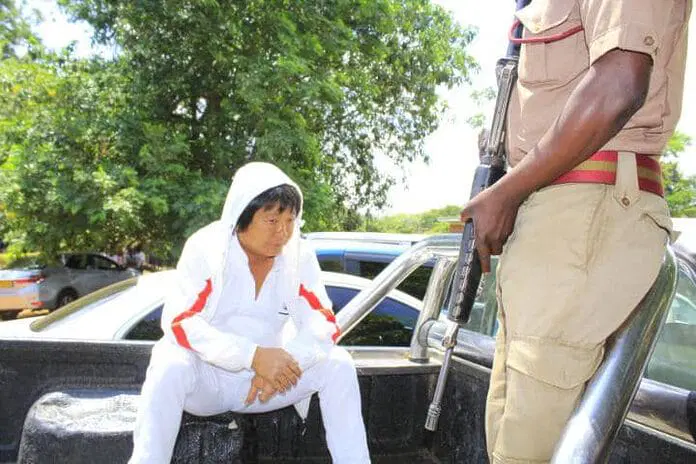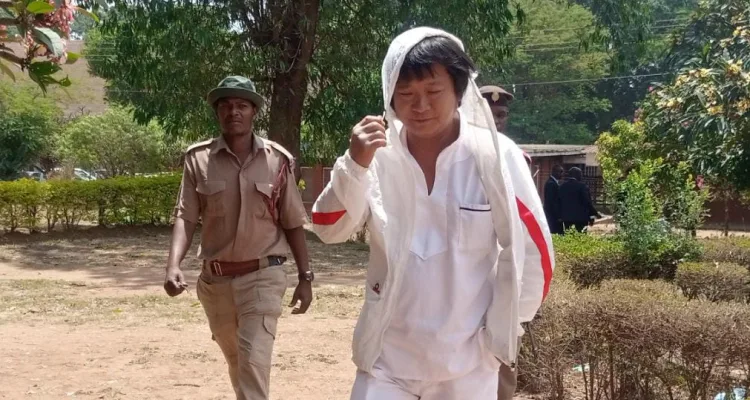Africa News 24 Bureau in Pretoria
LILONGWE, Malawi – A Lilongwe Principal Resident Magistrate, Benjamin Chulu, has ordered that wildlife crime syndicate leader Lin Yun Hua be kept in remand prison pending trial on explosive corruption charges, reigniting a fierce debate over accountability, environmental justice, and political interference in Malawi’s legal system.
Lin, who is of Chinese descent, infamously dubbed “Malawi’s Environmental Plunderer,” was controversially granted a presidential pardon in April 2025 after serving just six years of a 14-year sentence for trafficking 103 kg of rhino horn and laundering millions through his transnational criminal network. His impending release sparked outrage among conservation groups, who decried the move as a slap on the wrist for crimes devastating to Africa’s wildlife.
Magistrate Chulu’s ruling on Tuesday, however, delivered a reprieve for critics. Denying bail, he sided with the Anti-Corruption Bureau (ACB), which alleges Lin bribed prison officials and a magistrate to enjoy a “luxury jail experience” while plotting further crimes. The court set June 4 as the date to outline trial procedures.
ACB prosecutors paint a damning portrait of Lin’s alleged behind-bars corruption. He is accused of offering MK30 million ($17,500) and construction contracts to former Maula Prison chief Aaron Ganyavu Kaunda in exchange for unauthorised trips to his home, private errands, and cushy jail conditions. Shockingly, he also allegedly attempted to bribe Magistrate Violet Chipao, now a High Court judge, during his 2021 wildlife trial.

“This case exposes how deep the rot goes,” said ACB Principal Legal Officer Peter Sambani. “We have evidence of systemic bribery, and we are ready to parade witnesses.” Lin faces five counts of abuse of public office and violations of Malawi’s Corrupt Practices Act.
The presidential pardon had drawn fierce condemnation from groups like the Movement for Environmental Action (MEA), Centre for Environmental Policy and Advocacy (CEPA), and Citizens United for Renewable Energy (CURE). Charles Mkoka, CURE’s executive director, called the pardon “a betrayal,” stressing that wildlife crimes “demand the same seriousness as rape or murder.”
Activist Mathews Malata warned of reputational ruin: “Releasing Lin undermines global trust. Our partnerships with international conservation bodies hang in the balance.”
Lin’s original conviction in 2021 marked a rare victory against wildlife trafficking rings exploiting Africa’s natural resources. His syndicate, tied to Chinese organised crime, smuggled ivory, rhino horn, and rare reptiles from Malawi to Asia. Yet his pardon, reportedly backed by influential figures, raised suspicions of high-level collusion.
More from Africa News 24
Suspected wildlife trafficking kingpin arrested in Nigeria following joint operation
Magistrate Chulu’s refusal to grant bail has been hailed as a critical step toward accountability. “This is a litmus test,” said legal analyst Grace Mhango. “Will the courts resist pressure and prosecute these corruption claims thoroughly, or will political interests prevail?”
As June 4 approaches, Malawi’s justice system faces intense scrutiny. The ACB’s case hinges on proving Lin’s brazen attempts to manipulate officials, a scenario activists say underscores the nexus between environmental crime and graft.
For conservationists, the trial is about more than one man: it’s a battle for Malawi’s ethical future. “If Yun Hua walks again, it signals open season on our wildlife,” Mkoka said. “The world is watching.”
With Malawi’s endangered ecosystems and international credibility at stake, the coming weeks will determine whether justice or impunity prevails.












